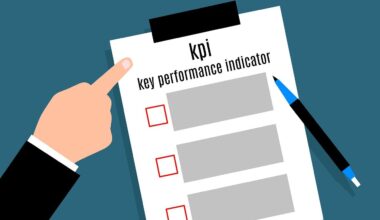Training Your Team for Effective Crisis Response
Effective crisis response requires a well-trained team that can quickly adapt to changing situations. To initiate this process, organizations must first understand the importance of incorporating crisis management training. Regular training sessions will prepare team members to handle unexpected events and communicate effectively under pressure. Crucial elements include redefining roles and establishing clear communication channels. Workshops can be employed to simulate real-life scenarios where teams practice responding to various crises that could potentially threaten the brand’s reputation. Additionally, highlighting successful case studies of crisis management can motivate team members and offer valuable insights. This gives them an understanding of how strategic thinking and quick decision-making can protect a brand from adverse impacts. Crisis response protocols, like predefined statements and action plans, must be implemented in training. Engaging stakeholders in crisis simulations encourages active participation and boosts confidence, better preparing them for real situations. Finally, it’s vital to create a supportive environment that encourages feedback, enabling continuous improvement of crisis management strategies. By thoroughly equipping team members, businesses position themselves to effectively manage crises and mitigate risks, safeguarding their brand reputation effectively.
Regular evaluations are integral to solidifying any crisis response plan. Each training session should conclude with a review of lessons learned and constructive feedback from participants. Analyzing what went well and what could be improved allows teams to adjust their strategies accordingly. It’s essential to foster an open dialogue where each member feels valued and heard. Establishing a feedback loop can significantly enhance the effectiveness of crisis training initiatives. In addition to feedback, stakeholders should routinely update training materials to align with changing market dynamics and emerging threats. Incorporating digital tools into training processes can streamline feedback and enhance performance tracking. Technology facilitates real-time assessments and allows teams to monitor their progress, thus maintaining preparedness for potential crises. Furthermore, organizations must stay updated on industry best practices, including adapting their crisis response plans based on lessons learned from others. Networking with professionals in the field can yield valuable insights that translate into improved training programs. Additionally, examining high-profile crises can reveal patterns and guide organizations toward effective preventive measures, further ensuring brand security. Consequently, continuous learning must be embedded within the crisis management framework, making teams agile and knowledgeable.
Importance of Crisis Communication
Crisis communication is a critical aspect of any successful crisis management plan. Teams must understand that communication should be prompt, clear, and consistent. Establishing a well-defined communication strategy ensures that accurate information reaches stakeholders swiftly. The initial response can set the tone for how a crisis is perceived externally, making the role of a well-prepared spokesperson crucial. Organizations should identify key individuals who can maintain composure under pressure and articulate messages effectively. Crisis communication training equips these representatives with skills for addressing the media, stakeholders, and the public efficiently. Additionally, establishing a centralized platform for information dissemination is vital in ensuring that everyone receives the same message at the same time. Miscommunication during a crisis can exacerbate situations, leading to further reputational damage. Therefore, frequent rehearsals should include communication strategies focusing on maintaining transparency and managing public perception. Teams should also focus on harnessing social media, which plays an increasingly important role during crises. Learning to monitor and respond to social media reactions can mitigate misinformation and foster a positive dialogue with audiences. By prioritizing crisis communication, businesses enhance their ability to navigate challenges, ultimately preserving their brand integrity.
Crisis simulation exercises are an effective method for training teams in real-world applications. These exercises create realistic scenarios that compel team members to respond as they would in actual crises. Role-playing various participants, such as consumers, journalists, or stakeholders, can deepen understanding and empathy, as team members experience the pressure of real-time decision-making. The benefits of crisis simulations extend beyond response training; they also enable teams to identify cracks in their current crisis management strategies. By evaluating performance during these drills, organizations can pinpoint specific areas that require improvement and knowledge gaps that need addressing. Moreover, including diverse perspectives in these exercises fosters a well-rounded approach to crisis management. It’s essential to frequently rotate teams during simulations to ensure that everyone shares the responsibility and has ample exposure to various crisis scenarios. Documenting the outcomes of each exercise provides an actionable playbook for addressing future challenges. This continuously evolving training resource serves as both a reference and a motivation for ongoing education. Therefore, participating in realistic simulations builds resilience, enhances team coordination, and ultimately contributes to a more effective crisis response process.
Building a Crisis Management Culture
Establishing a crisis management culture begins at the top, with leadership committing to prioritizing preparedness. This dedication must permeate the organizational ethos, ensuring that every member understands their role in mitigating crises. By normalizing open discussions about crises and their potential impacts, organizations cultivate an environment where proactive measures thrive. Leaders can initiate this transformation by actively participating in training sessions, serving as role models for employees. A leadership presence not only reinforces the importance of crisis management but also inspires engagement. Furthermore, recognizing team members who exhibit exemplary crisis management skills reinforces positive behaviors and encourages others to develop their skills. This formal acknowledgment can take many forms, such as awards or public recognition during team meetings. Regularly revisiting the organization’s crisis management objectives can also maintain momentum and a collective sense of ownership. Employees should feel empowered to voice concerns and offer suggestions about crisis strategies. When a brand fosters a culture centered around crisis preparedness, it demonstrates a commitment to safeguarding its integrity, assuring stakeholders their team is equipped to navigate challenges effectively. Thus, investing in a crisis management culture strengthens the entire organization.
Investment in ongoing training is essential for the long-term success of a crisis management initiative. Adaptability is crucial in the ever-evolving landscape, making it vital to refine training methods regularly. Incorporating innovative approaches, such as gamification or interactive workshops, can enhance engagement levels among team members. Providing opportunities for cross-departmental training can also nurture collaboration and understanding throughout the organization. This interconnectedness fosters a sense of community, ensuring everyone is on the same page when crises arise. Access to external experts may also enrich training sessions, especially those experienced in crisis management. Collaboration with these specialists can bring fresh perspectives and valuable strategies that would benefit your organization. Furthermore, organizations should consider using case studies to analyze past crises, both their successes and failures. Learning from others’ experiences, rather than solely relying on internal knowledge, can bolster the effectiveness of crisis management training. Continuous education avenues, such as workshops or online courses, keep the knowledge base up to date, aligning with industry changes. Investing in these ongoing training endeavors illustrates a commitment to excellence in crisis management, solidifying a brand’s resilience against unforeseen challenges.
Conclusion and Future Directions
The future of crisis management training hinges on the evolution of strategies and tools used in preparation. Embracing new technologies and methods ensures teams stay ahead of potential threats while enhancing their responsiveness. As brands evolve, so too must the training programs that aim to protect them. A proactive approach encompasses not only refining existing protocols but also predicting potential crises based on industry trends and consumer behavior. Meeting these future demands entails a commitment to fostering a learning mindset among team members, promoting a culture where agility and innovation are key. Organizations should also remain open to adapting their approaches based on ongoing evaluation of successes and setbacks. Collaborating with teams across various functions can create a more cohesive response framework. Therefore, keeping crisis management relevant will require continuous investment, adaptability, and an unwavering dedication to team development. By equipping teams thoroughly for moments of uncertainty, businesses position themselves to emerge stronger from challenges. Through comprehensive training, open communication, and a culture steeped in preparedness, brands can navigate crises effectively and protect their reputation in an increasingly complex environment.
The application of lessons learned from past experiences can guide the development of more effective crisis management protocols. By analyzing how similar brands navigated crises, businesses gain valuable insights into effective response strategies. Furthermore, this data-driven approach fosters informed decision-making, allowing companies to anticipate challenges proactively. Organizations, therefore, must establish a mechanism for capturing and analyzing crisis-related data, ensuring that past events inform future practices. Engaging with industry forums or associations can provide organizations with benchmark data, showing how peers approach crisis situations. This external perspective supplements internal findings and promotes collective learning within the industry. Ultimately, a comprehensive understanding of previous crises drives the ongoing evolution of training programs and strategies. As crises arise and landscapes shift, leveraging this knowledge leads to improved resilience and preparation. Proactively applying past lessons results in robust crisis capabilities that enable teams to act decisively. In conclusion, embracing these insights solidifies a brand’s crisis management foundation, aligning strategies with industry best practices. This commitment to continuous improvement ensures that organizations remain strong and agile in the face of adversity. By prioritizing ongoing learning, businesses secure their reputation while navigating uncertainties effectively.


